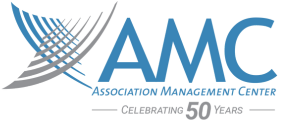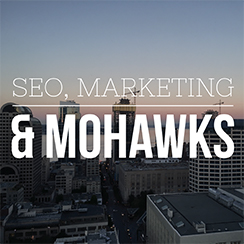
SEO, Marketing and Mohawks: 5 Takeaways from MozCon
I’ll be honest. Conferences cause me great anxiety. Working for an association management company has provided me with an “out” in that I’m typically working at the there is a collection of coworkers, familiar faces with whom I’ve some sort of established relationship.
But when I’m at a conference as an attendee, I’m typically without this comforting familiarity—and it turns me into a tangle of nerves. Rather than stand around looking for someone to ask an unoriginal ice breaker question to, I would much rather walk speedily and purposefully toward my quiet hotel room.
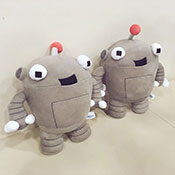 Despite this, since embarking on a new career path in the digital marketing space, I’ve found myself attending quite a few events with frightening words in their descriptions like “networking.” Recently, I had the great privilege (I really mean that) of attending MozCon, a leading conference on SEO, digital marketing, content marketing, social media, etc. In addition to their marketing expertise, Moz is known for their delightful ways of connecting with customers (see Moz’s mascot Roger as a plush doll at right, acquired from an arcade-style claw machine), I knew this was going to be an experience that filled my professional and personal tanks, despite my aversion to socializing.
Despite this, since embarking on a new career path in the digital marketing space, I’ve found myself attending quite a few events with frightening words in their descriptions like “networking.” Recently, I had the great privilege (I really mean that) of attending MozCon, a leading conference on SEO, digital marketing, content marketing, social media, etc. In addition to their marketing expertise, Moz is known for their delightful ways of connecting with customers (see Moz’s mascot Roger as a plush doll at right, acquired from an arcade-style claw machine), I knew this was going to be an experience that filled my professional and personal tanks, despite my aversion to socializing.
Here are some of my key takeaways from those three days at MozCon.
Quality Is a Sitewide Metric.
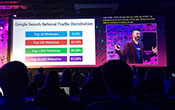 The “mohawks” part of my title comes from the opening keynote speaker, Rand Fishkin, founder and former Moz CEO, affectionately known as the Wizard of Moz. His handlebar mustache and mohawk make frequent appearances on my Twitter feed, and they also played supporting roles in setting the tone for the rest of the conference. This was not your average stuffy conference.
The “mohawks” part of my title comes from the opening keynote speaker, Rand Fishkin, founder and former Moz CEO, affectionately known as the Wizard of Moz. His handlebar mustache and mohawk make frequent appearances on my Twitter feed, and they also played supporting roles in setting the tone for the rest of the conference. This was not your average stuffy conference.
Fishkin focused on SEO and the ways it has changed and grown in importance for the digital marketer. When talking about different aspects of SEO and how they affect search rankings, he made one thing very clear: our roles as marketers have expanded and changed in immeasurable ways as a result of search engines.
He summarized it all when he said, “Quality is a site-wide metric.” We cannot boil down SEO to merely keywords or organic traffic or metadata. Page by page, SEO is a discipline that requires continuous agility and attentiveness. With the creation of every webpage and the turning of every calendar page, optimization can look different. Fishkin demonstrated just how far down that rabbit hole can go, but it was clear that opportunities to nudge and keep our rankings high are found throughout our websites.
Follow the Data, Not Your Feelings.
Cara Harshman from Optimizely emphasized the importance of testing assumptions based on fact rather than feelings. “Great hypotheses are born out of reason and data, not whiteboard sessions,” she said.
Working in the nonprofit world, a tremendous feeling of indebtedness to our volunteers for their expertise and dedication sometimes can make us forget or even suppress our roles in the success of our organizations. Harshman reminded me that we bear the responsibility of accurately contextualizing our collaborators’ (both internal and external) assumptions.
It is to our mutual benefit to confirm or adjust our beliefs about what our audience wants and how they want to interact with us. The only way to get the true answers is to look into the data we have and then to perform tests.
Meaningful Experiences Require a Deeper Understanding.
Conversion optimization expert Talia Wolf of Banana Splash spoke on conversion rate optimization (CRO) and turning mobile visitors into customers based on A/B tests of their emotions, decision-making process, and behaviors. She stressed the importance of understanding people better through testing and research to create better experiences for our audiences (translation: higher conversions).
Though Wolf was focused primarily on the mobile context, her assertions ring true for all types of marketing. She cited a RightNow Customer Impact Report commissioned by Oracle that revealed 86% of consumers are willing to pay 25% more for better customer experience. Our customers want more than just the lowest price.
This lack of insight has led to a lack of substance—forgettable marketing. “A wealth of information creates a poverty of attention,” says Wolf. We must direct our energies into creating meaningful interactions with our customers, including those seemingly uninspiring webpages.
Be Memorable.
The inspiration to improve customer experience continued with Joanna Wiebe, a leading expert in copywriting and founder of Copy Hackers. Wiebe couched the battle of effective copywriting in a war for conversions, not mere influence.
She noted that though “…we’re bombarded with 5,000 ad messages a day, we recognize 50 and remember 4.” But rather than being overwhelmed by a competition against 5,000, she says we are really competing with those four messages.
She tasked us with creating specific and personal messaging that would immediate take us out of the noise and place us in direct competition with only the four voices speaking clearly and directly at our target audiences.
By writing copy that is specifically about our target audience, doing the work to explicitly connect the dots (don’t be vague), and using words that trigger images in people’s minds, we can capture the coveted attention of our customers.
Actually Tell the Story. Don’t Just Hint at One.
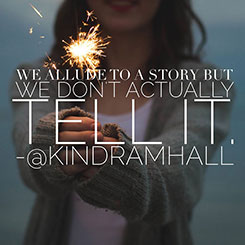 Kindra Hall was the perfect choice for kicking off the final day of what was a jam-packed conference. An expert in storytelling, Hall illustrated the importance of a good story by citing research from Paul Zak that showed character-driven stories consistently cause oxytocin synthesis, motivating collaborative behavior. Stories affect brain chemistry.
Kindra Hall was the perfect choice for kicking off the final day of what was a jam-packed conference. An expert in storytelling, Hall illustrated the importance of a good story by citing research from Paul Zak that showed character-driven stories consistently cause oxytocin synthesis, motivating collaborative behavior. Stories affect brain chemistry.
Despite this, Hall says marketers often commit this huge mistake. “We allude to story, but we don’t actually tell it.”
We use taglines, slogans, and mission statements; bulleted lists of features and benefits; and catchy copy or trendy infographics to talk about the story. These things do not have characters to care about, emotions, and something at stake.
Hall encouraged us to find our stories by collecting our organizations’ differentiators and our customers’ transformation stories. From there, we are to craft our stories by walking our audiences through what was, what happened when the product or service came into play, and how that created a new normal.
By telling stories about individual people in specific moments with vivid details and emotions, we can tell a really great story about the value of what our organizations do and who we are.
Bonus: You Can Find “Your” People Anywhere
The great tidbits I got from the MozCon speakers came with a happy side effect of common ground upon which to strike up conversation with other attendees. A great tactic I’ve noticed used by a conference organizers is to create a Facebook group dedicated to that conference. Members of the group can be attendees from any year of the event, and conversations can begin in the unthreatening social media space long before the conference event takes place.
The evening before MozCon started, I connected with another Chicago Cubs fan (GO CUBS!) on the MozCon Facebook page who was also looking for a place to watch the game. The next day, while waiting in line for the elevator, we met a Brazilian who was soon relocating to Chicago. The three of us then later connected with someone she had met who was from Israel. The four of us stuck together through the conference, eating meals together and saving seats for one another.
I realized that I could find a crew of my own wherever I went if I was open it. Professional and personal tanks full, I’m even thinking of looking for opportunities to present at conferences in the near future. This openness might be the most valuable takeaway for me.
June Pinyo is a managing editor in AMC’s Creative Media Services department and co-lead for the AMC Content Managers User Group. For more tips and conversation on content marketing, follow June on Twitter.
